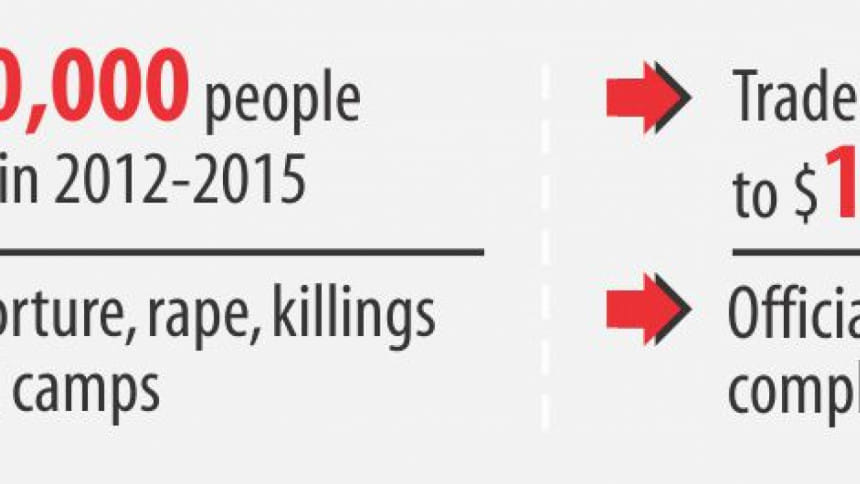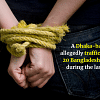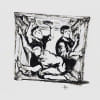Human Trafficking: Rohingyas faced horrific crimes

A transnational human-trafficking syndicate committed crimes against humanity in Malaysia and Thailand against the Rohingya from 2012 to 2015, the Human Rights Commission of Malaysia (SUHAKAM) and Fortify Rights, a nongovernment rights body, have found in a six-year investigation.
During 2012-15, more than 170,000 people boarded ships from Myanmar and Bangladesh bound for Malaysia and Thailand, and the trade over Rohingyas is estimated to have generated between $50 and $100 million a year.
At sea and in the camps of Thai and Malaysian borders, the trafficking network committed "murder, extermination, enslavement, deportation or forcible transfer, imprisonment, torture, and rape, as part of a widespread and systematic attack directed against Rohingya civilians from Myanmar and Bangladesh" with knowledge of the widespread and systematic attack underway, the report said.
The majority of people trafficked were Rohingya Muslims, but in late 2014 and 2015, traffickers began to target Bangladeshi nationals as well, says the joint report "Sold Like Fish" released in Bangkok yesterday.
"The Commission and Fortify Rights therefore have reasonable grounds to believe that human-trafficking networks committed crimes against humanity at sea and in camps in Malaysia and Thailand against Rohingya civilians from 2012 to 2015," said the report.
It comes at a time when the world witnesses one of the biggest refugee crisis as some 750,000 Rohingyas fled a brutal military crackdown in Myanmar's Rakhine state, where they are denied citizenship and basic rights, since August 2017.
Escalation of conflicts between Arakan Army and Myanmar military is currently displacing thousands in Rakhine state.
Meanwhile, dozens of cases of trafficking of Rohingyas from the refugee camps in Cox's Bazar to Malaysia and Indonesia made headlines in recent months.
"The victims of these crimes and their families suffered tremendously, and these horrific crimes should never happen again in Malaysia and anywhere else for that matter," said SUHAKAM Commissioner Jerald Joseph in a statement.
WHAT HAPPENED IN 2012-2015?
On April 30, 2015, the Thai authorities discovered more than 30 bodies in a mass grave in a makeshift camp near Malaysian border. Then on May 25 the same year, Malaysian police announced discovery of 139 graves and 28 suspected human-trafficking camps in Wang Kelian, Perlis State.
The discoveries led to a crackdown against human traffickers only to find another crisis in the sea where some 5000 to 6000 victims of human trafficking -- believed to be Rohingyas and Bangladeshis -- were found drifting in rickety boats. After initial reluctance, Thailand, Malaysia and Indonesia rescued them.
The investigation is based on more than 270 interviews with eyewitnesses, survivors, human traffickers, government officials, and others from 2013 to 2019.
It revealed traffickers piled hundreds and thousands of Rohingya refugees into repurposed fishing vessels and deprived them of adequate food, water, and space, committing torture and, in some cases, rape at sea.
Traffickers murdered captives, and many died by suicide at sea. In the Thai and Malaysian jungle camps, traffickers provided their captives with three options: raise upwards of $2,000 in exchange for release, be sold into further exploitation, or die in the camps, the report said.
Members of a syndicate tortured, killed, raped, and otherwise abused untold numbers of men, women, and children, buying and selling them systematically in many cases, in concert with government officials.
Traffickers from Myanmar, Thailand, and Malaysia denied their captives access to adequate food, water, and space, resulting in deaths, illness, and injury. They tortured Rohingya captives with pipes, bats, clubs, belts, wires, tasers, nails, threats and intimidation, and other means, the report said.
"When I was unable to pay the money to the men, they poured boiling water on my head and body," said a Rohingya Muslim who was 16 years old when traffickers tortured him in a camp on the Malaysia-Thailand border in 2014.
The perpetrators also murdered or caused the death of captives and buried bodies in mass graves and, in some cases, forced captives to bury bodies.
"People died every day," said a 20-year-old Rohingya woman who survived a human-trafficking camp on the border. "Some days more, some days less, but people died every day."
Traffickers also systematically sold untold numbers of Rohingya women and girls into forced marriages and situations of domestic servitude in Malaysia, said the report.
"For years, this was a calculated business and attack on the Rohingya community," said Matthew Smith, Chief Executive Officer of Fortify Rights.
"The massive scale and horrific severity of these operations were never properly documented or fully prosecuted. This new evidence demonstrates the need for accountability."
However, that still remains a far cry. In 2017, Thailand convicted 62 defendants, including nine Thai government officials, for crimes related to the human trafficking. Since 2015, Malaysian courts convicted only four non-Malaysian persons of trafficking-related offences connected to the mass graves discovered at Wang Kelian in Perlis.
Eyewitness testimonies indicate the complicity or, in some cases, direct involvement of government authorities in the transnational trade over Rohingya refugees. Thai authorities extra-judicially transferred or sold them from state custody to members of a transnational human-trafficking syndicate, the report said.
Late last month, Malaysia created a Royal Commission of Inquiry to investigate and ensure accountability for the human trafficking and mass graves in Wang Kelian.
"There's a fresh political will in Malaysia to right these wrongs and ensure justice and accountability for Rohingya and all victims of these heinous crimes," said Jerald Joseph of SUHAKAM.
SUHAKAM and Fortify Rights demand protection of the survivors of these attacks under Malaysian law as survivors of human trafficking, and, in the case of Rohingya, protection as refugees.
The Malaysia government should put into place measures to prevent such crimes from occurring again, the report said.
"The international community should do everything in its power to address the root causes of this crisis in Myanmar."

 For all latest news, follow The Daily Star's Google News channel.
For all latest news, follow The Daily Star's Google News channel. 







Comments